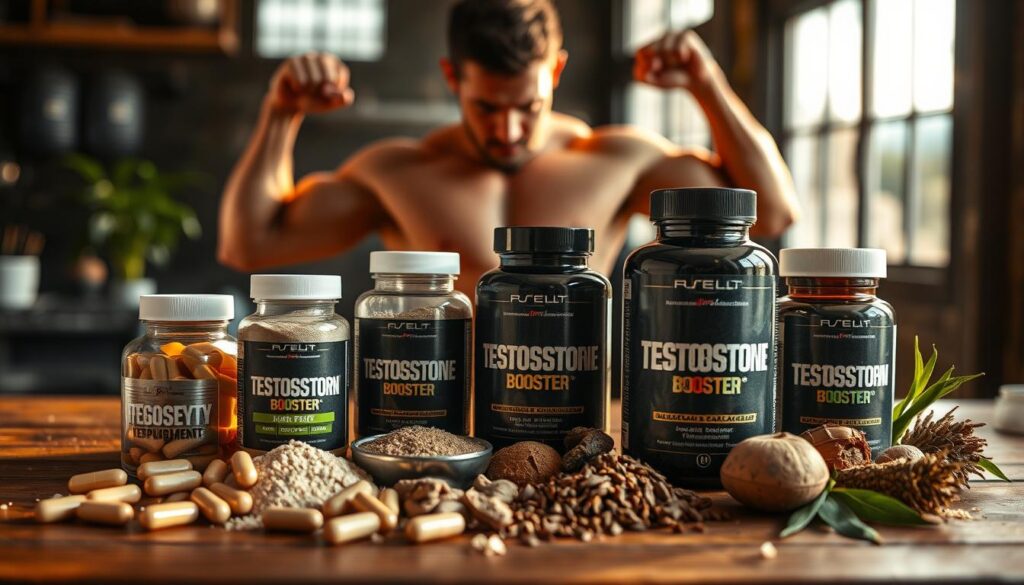As you get older, your testosterone levels drop. This happens at a rate of 1% to 2% each year after 30 or 40. Testosterone therapy is an option, but it can raise the risk of heart problems. Many men over 40 look for natural ways to keep their energy and muscle up.
In this detailed article, we’ll explore testosterone’s role, the good and bad of boosters, and natural ways to boost it. We’ll also look at the best supplements for men over 40. By the end, you’ll know how to support your testosterone safely as you age.
Key Takeaways
- Testosterone levels naturally decline by 1-2% per year after age 40, affecting muscle mass, libido, and overall health.
- Natural testosterone boosters can help support healthy levels without the risks of testosterone therapy.
- Supplements like zinc, magnesium, vitamin D, and ashwagandha have been shown to increase testosterone in men.
- Lifestyle factors like exercise, weight management, and stress reduction can also naturally boost testosterone.
- Consulting with your doctor is crucial when considering testosterone boosters or therapy.
Understanding the Role of Testosterone
Testosterone is the main hormone in men, affecting many body functions. It helps develop male features, makes sperm, grows muscles, keeps bones strong, and affects mood. Knowing how important testosterone is helps men stay healthy, especially as they get older.
Testosterone’s Effects on Male Bodily Functions
Testosterone affects the male body in many ways. It helps make sperm and grow facial and body hair. It also makes the voice deeper and helps muscles grow and bones stay strong.
Normal Testosterone Decline with Age
Testosterone levels drop as men get older. This starts around age 30 or 40. Levels fall by 1% to 2% each year. This decline can cause health problems like less muscle, lower libido, and brain issues.
Symptoms of Low Testosterone Levels
Low testosterone can cause many symptoms in men. These include:
- Loss of muscle mass and strength
- Increased body fat
- Decreased sex drive and erectile dysfunction
- Fatigue and decreased energy levels
- Mood changes, such as irritability and depression
- Difficulty concentrating and cognitive impairment
- Reduced bone density and increased risk of osteoporosis
It’s important to notice and treat these symptoms to stay healthy as men age.

What are Testosterone Boosters?
Testosterone boosters are supplements that help increase the male hormone testosterone in the body. They don’t add testosterone directly like therapy does. Instead, they give the body the nutrients it needs to make more testosterone on its own.
Difference Between Boosters and Testosterone Therapy
Testosterone boosters and therapy are different in how they tackle low testosterone. Testosterone boosters use vitamins, minerals, and herbs to boost natural testosterone. Therapy, however, involves giving testosterone directly through gels, patches, or injections. This is done under a doctor’s watch.
| Testosterone Boosters | Testosterone Therapy |
|---|---|
| Aim to increase the body’s natural testosterone production | Involve direct supplementation of the testosterone hormone |
| Use a combination of nutrients and compounds to stimulate testosterone production | Require a prescription and medical supervision |
| Do not require a prescription | Carry potential side effects like mood swings, liver injury, and high blood pressure |
| Typically have fewer side effects than testosterone therapy | May be banned for use in athletes by some organizations |
Testosterone boosters aim to boost the body’s natural testosterone. Therapy, on the other hand, adds testosterone directly. Knowing the difference is key when looking to increase testosterone levels.

Types of Testosterone Boosters
There are several key ingredients in testosterone boosters. These include d-aspartic acid, zinc, magnesium, vitamin D, DHEA, and ashwagandha. Let’s explore each ingredient and its effect on testosterone levels.
D-Aspartic Acid
D-aspartic acid is an amino acid that may boost hormones that increase testosterone. Animal studies show promise, but human results are still unclear.
Zinc
Zinc is vital for testosterone production. Men with zinc deficiencies may have lower testosterone. Zinc supplements can help restore normal levels.
Magnesium
Magnesium is linked to higher testosterone levels. Adequate magnesium intake, through food or supplements, supports healthy testosterone.
Vitamin D
Vitamin D affects testosterone production. Men with vitamin D deficiencies often have lower testosterone. Vitamin D supplements may increase testosterone in deficient individuals.
DHEA
DHEA is a hormone used by the body to make testosterone. While DHEA supplements are promoted, their effectiveness is debated. More research is needed.
Ashwagandha
Ashwagandha is an herb studied for its testosterone-boosting potential. Some research suggests it may raise testosterone levels. However, more conclusive studies are required.
Remember, the effectiveness and safety of testosterone boosters vary. Always consult a healthcare professional before starting any new supplements.
Concerns and Side Effects of Testosterone Boosters
Testosterone boosters can help men over 40 in many ways. But, it’s important to know about the possible concerns and side effects. These supplements are not as closely watched by the FDA as prescription drugs. This means you can’t always be sure about the quality of what you’re taking.
Some side effects of testosterone boosters include:
- Anemia and immune system issues from too much zinc
- Digestive problems and kidney damage from high vitamin D levels
- Potential liver damage from DHEA or ashwagandha
Using testosterone therapy can also lead to risks. These include high blood pressure, more red blood cells, and problems with the prostate. Women, especially those who might get pregnant, should not use these boosters because of the risk of birth defects.
Access testosterone products here >>>
It’s key to watch for signs of side effects, such as:
- Arm or leg pain, redness, swelling, chest pains, or trouble breathing (blood clotting problems)
- Chest pain spreading to the arms, jaw, back or neck, faintness, headaches, and trouble breathing (heart or blood vessel problems)
- Upper stomach pain, pale stools, dark urine, loss of appetite, nausea, vomiting, or yellowing of the eyes or skin (liver problems)
- Agitation, irritability, abnormal behaviors, suicidal thoughts, or depression (behavioral changes)
- Swelling of the breasts and breast pain (gynecomastia)
- Stomach pain, confusion, constipation, depression, increased urination, metallic taste, or muscle weakness (high calcium in the blood)
Talking to a healthcare provider about any concerns or side effects is crucial. They can help manage these issues. It’s also important not to take more than the recommended dose. This can help avoid bad habits or other harmful effects.
Natural Ways to Increase Testosterone
There are many natural ways to boost your testosterone levels. Exercise, weight management, diet, and lifestyle changes can help. These adjustments support your body’s natural testosterone production.
Exercise and Testosterone
Regular exercise, especially weight-bearing and high-intensity interval training, boosts testosterone. Strength training is more effective than cardio in raising testosterone levels.
Weight Management and Testosterone
Keeping a healthy weight is key for testosterone. Obese men have up to 30% lower testosterone than lean men. Physical activity, not just weight loss, is better for testosterone.
Diet for Boosting Testosterone
Eating foods rich in testosterone-boosting nutrients helps. Lean beef, chicken, fish, eggs, tofu, nuts, and seeds are good sources of protein. Vitamin D from fatty fish, zinc from mollusks and beans, and magnesium from spinach and almonds also boost testosterone.
Lifestyle Factors Impacting Testosterone
Some lifestyle habits affect testosterone levels. Getting 7-8 hours of sleep each night is essential, as sleep loss can lower testosterone by up to 15%. Chronic stress also impacts testosterone, so managing stress is important. Limiting alcohol and avoiding chemicals like BPA in plastics also helps keep testosterone levels healthy.
“A combination of strength training, weight management, and a nutrient-rich diet can go a long way in naturally boosting your testosterone levels.”
Top 5 Testosterone Boosters for Men Over 40
For men over 40, keeping testosterone levels right is key for health and energy. Luckily, there are many good testosterone boosters to help with age-related hormone drops. We’ve picked the top 5 for men in this age group after a lot of research.
Testosil: Best Overall
Testosil is our top choice for men over 40. It costs $2.30 per serving and fights hormonal changes with ingredients like D-aspartic acid and zinc. It’s known for boosting energy, muscle growth, and overall health.
Testogen: Runner-Up
Testogen is a great second choice for men over 40. It has a mix of natural ingredients like D-aspartic acid and ginseng to help testosterone. It’s good for libido, muscle, and mood.
Nutricost Testosterone Support Complex: Best Budget Option
The Nutricost Testosterone Support Complex is a budget-friendly option. It costs $1.83 per serving and has ingredients like KSM-66 Ashwagandha. This has been shown to raise testosterone by up to 17%.
TestoPrime: Best for Mood Enhancement
TestoPrime is the best for mood in men over 40. It has a mix of ingredients like D-aspartic acid and Ashwagandha. It helps with testosterone and mood.
Nugenix Total-T: Fastest Results
Nugenix Total-T is known for quick results. It has zinc, fenugreek, and L-citrulline malate. These ingredients quickly boost testosterone and improve performance.
When picking a testosterone booster, look at the ingredients, research, reviews, and value. These top 5 options help men over 40 keep their hormones balanced, energy up, and well-being high.
Testosterone Boosters for Women and Transgender Individuals
Testosterone is important for everyone, not just men. Women naturally have some testosterone, which helps with sex, bones, muscles, energy, and mood. As women get older, especially during menopause, their testosterone levels can drop. This might lead some to try testosterone boosters to feel better.
Transgender and non-binary people might also use testosterone boosters to look more masculine. But, they should talk to a doctor first. This is because testosterone therapy can affect fertility, mood, and health in big ways.
The FDA hasn’t approved testosterone boosters for menopause symptoms in women. Yet, some women might feel better using them. But, we don’t know for sure how safe or effective they are in the long run. Anyone thinking about testosterone boosters should talk to a doctor first.
“Testosterone plays a vital role in the health and well-being of individuals across the gender spectrum, but the use of testosterone boosters should be carefully considered and monitored by healthcare providers.”
In short, testosterone boosters might help some women and transgender individuals. But, they should be used carefully and with a doctor’s help. This ensures they are safe and meet each person’s health needs and goals.
Testosterone Therapy: Benefits and Risks
Testosterone therapy, also known as androgen replacement therapy, involves adding testosterone to the body. It helps men with low testosterone levels due to hypogonadism. But, for healthy men with normal age-related decline, its benefits are not as clear.
As men get older, their testosterone levels drop. Studies show testosterone peaks at 17 and falls by 1% yearly from 30 to 40. By 70, levels are about 30% lower than at their peak.
Potential benefits of testosterone therapy include better sex, more muscle and bone, and improved mood and energy. But, there are risks like worsened sleep apnea, increased red blood cells, prostate issues, and heart disease risks.
Talking to your doctor about testosterone therapy is crucial, especially for normal age decline. They can decide if it’s right for you and watch for side effects.
“The decline of androgen levels in elderly men and its clinical implications.” – Study, 2005
In summary, testosterone therapy helps men with low testosterone. But, its risks and benefits for healthy men with age-related decline are unclear. Always consult your doctor to find the best treatment for you.
Consulting Your Doctor for Testosterone Boosters
Before trying any testosterone boosters, it’s key to talk to your doctor. They can check if you have a condition causing low testosterone. They’ll also tell you if supplements or prescription therapy are right for you.
Your doctor will guide you on safe amounts and how they might interact with your current meds. It’s vital to work with your healthcare provider when looking into natural or medical ways to boost testosterone.
Testosterone levels drop as we age. Many things can lower testosterone, like chemotherapy, testicular cancer, or obesity. Symptoms include weight gain, hair loss, and low sex drive.
While testosterone boosters available over-the-counter can raise testosterone, they might not fix the root problem. Your doctor will do a full check-up, including blood tests, to find the cause. They’ll then decide the best treatment, like testosterone therapy or a special plan.
But, it’s important to know that testosterone therapy’s long-term effects are still being studied. Some studies link it to cancer or heart disease in some patients. Your doctor will help you understand the risks and find the safest option for you.
Remember, it’s crucial to work closely with your doctor when dealing with testosterone decline. They can offer valuable advice and make sure any testosterone boosters or therapies are safe and right for you.
Conclusion
Testosterone boosters can help men over 40 deal with hormone drops. It’s key to know how testosterone works and the benefits and risks of boosters. Always talk to your doctor before starting any supplements.
Many boosters claim big benefits, but the truth is different. Only a few have been proven to really boost testosterone. It’s important to be careful and listen to your doctor to stay safe.
Testosterone boosters can be helpful, but they should be part of a healthy lifestyle. Eating well, exercising, managing stress, and treating health issues are also important. By doing these things, you can keep your hormones balanced and stay healthy as you get older.









